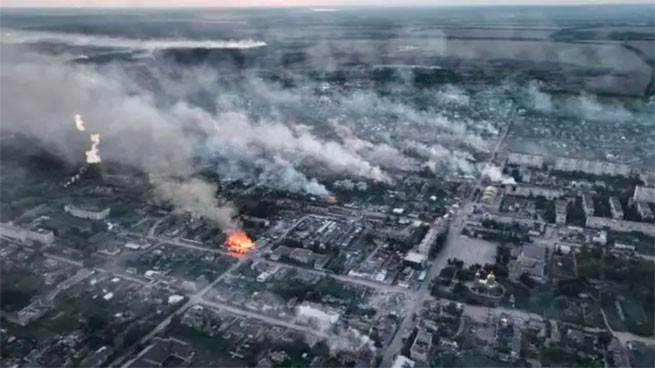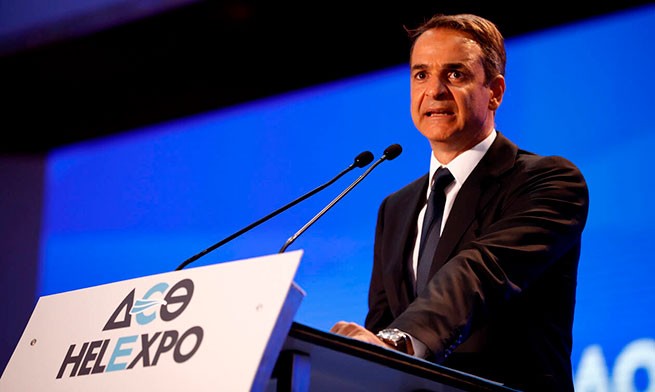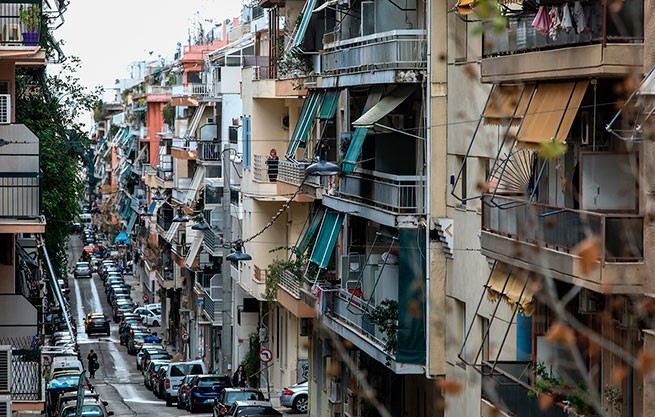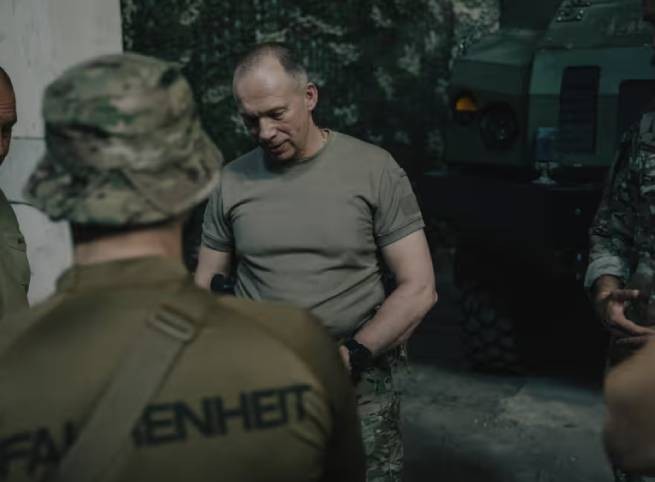Ukraine's Commander-in-Chief, Colonel-General Oleksandr Syrsky, gave an exclusive interview to The Guardian about the changing face of Europe's largest war in 1945.
In a conversation with journalists editions He assessed the recent failures of the Ukrainian Armed Forces and counterattacks, and shared his vision of how to turn the tide. However, he was laconic in answering the question, when will Ukraine receive the long-awaited F-16 fighters:
“I know. But I can't tell you about it, unfortunately.”
Oleksandr Syrsky is Ukraine's new commander-in-chief. His task is to defeat the larger Russian army. After two and a half years of full-scale war He acknowledges that the Russians are far better resourced. They have more of everything: soldiers, tanks, infantry fighting vehicles, soldiers. Their initial 100,000-strong invasion force has grown to 520,000, the general says, and plans to increase that to 690,000 by the end of 2024. The figures for Ukraine were not released, but he clarified:
“When it comes to equipment, the ratio is 1:2 or 1:3 in their favor. Since 2022, the number of Russian tanks has “doubled” – from 1,700 to 3,500. There are three times more artillery systems, and armored personnel carriers – from 4,500 to 8,900. The enemy has a significant advantage in forces and resources. Therefore, for us, the issue of supply, the issue of quality really comes first.”
It is this superiority of men and technology that explains the recent events on the battlefield.. Since last autumn, Ukraine’s armed forces have been in steady retreat. One of Syrsky’s first acts when he took the job in February 2024, replacing Valeriy Zaluzhny (now Ukraine’s ambassador to the UK), was to order the withdrawal of troops from Avdiivka. The retreat coincided with a six-month hiatus in U.S. arms supplies..
The Russians, the newspaper writes, are still seizing fields and villages in the eastern Donbas, using air-dropped bombs to force their way forward. They have seized territory northwest of Avdiivka, toward the garrison town of Pokrovsk, and have besieged the hilltop village of Chasov Yar. In May, Russian troops opened a new front in the Kharkiv region, storming the town of Vovchansk. Ukraine had anticipated the attack, but it seemed unable to stop it.
In an exclusive interview with the Guardian, his first with a foreign newspaper as top military chief, Syrsky admitted it had all been “very complicated”:
“The Russian aggressor is attacking our positions in many directions. Is it possible to stop the Russian offensive? Yes, of course. First of all, it depends on our brave soldiers, our officers. Quite often, steadfast and heroic Ukrainian units have defeated larger enemy groups.”
He cited Russia's latest attempt to seize Kharkov and the neighboring Sumy region as an example. “It failed,” Syrsky said. Fighting continued, but Putin's attempt to create a “so-called security corridor” near the Russian border and the Belgorod region was thwarted.
What about the rumors that Moscow is planning another offensive in the south of the Zaporizhia region? He replied: “If that happens, we will be able to give them a good answer.”
Overall, Syrsky sought to put the recent setbacks into context. He described Russia’s creeping victories as “tactical”—local gains—rather than “operational” breakthroughs such as capturing a major city:
“In principle, the enemy did not make significant progress. The front line was 3,700 km. Active combat operations were conducted on 977 km of it, or twice as long as the border between Germany and France.”
Syrsky emphasizes:
“Meanwhile, Russia's successes were achieved at a staggering human cost. The Kremlin's losses were three times higher than Ukraine's, and in some areas even higher. Their death toll was much higher.”
In February, Ukrainian President Volodymyr Zelensky said 31,000 Ukrainian servicemen had died since 2022. When journalists asked if Syrsky could update that figure, he declined, saying the losses were “sensitive” and a topic that Moscow could exploit.
Syrsky contrasted his battle tactics with those used by Russian commanders, who are known for sacrificing huge numbers of infantry to advance “100-200 meters”:
“It is very important for us to save the lives of our soldiers. We do not defend the ruins to the death.”
He said he was not prepared to “achieve goals at any cost” or throw his men into “useless meat attacks.” Sometimes it was necessary to move to “more advantageous positions.”
Amid skepticism about Ukraine's prospects for achieving total victory, Syrsky noted various positive developments. The F-16s will bolster Ukraine’s air defenses. They will allow Kyiv to work more effectively against Russian cruise missiles and accurately hit ground targets. But there are limits to what the F-16s can achieve, he said. They must remain “40 kilometers or more” from the front lines because of the risk of Moscow shooting them down.
Syrsky says that Drones play as big a role as artillery. Russia had “superior aviation” and “very strong” air defense. Because of this, Ukraine increasingly turned to drones. It used drones “very effectively” and tested “robotic ground systems” — ground robots that could deliver ammunition or rescue wounded soldiers. It created a new unmanned systems command, the first of its kind. “We’re not fighting with quantity, we’re fighting with quality,” he said.
The Ukrainian Armed Forces, the general said, successfully used long-range kamikaze drones to carry out strikes on Russian territory, to “about 200 critical infrastructure facilities.” All were related to “military logistics” and included factories, fuel depots, and ammunition depots. Meanwhile, marine dronesresembling speedboats, sank about a third of Russia's Black Sea navy:
“It really became a trap for them, and for some [судов] “grave.”
He added that the Kremlin was forced to “completely withdraw” from the Crimean port of Sevastopol after a series of Ukrainian attacksDrone and missile strikes destroyed radars and missile launchers. The key Ukrainian goal is to destroy the Kerch road and rail crossing connecting the occupied peninsula with Russia. Syrsky declined to say when that might happen. Two previous attempts involved a truck bomb and a drone strike.
The publication's journalists recalled that Kyiv had a plan to take back Crimea, more than a decade after Vladimir Putin illegally annexed it. Is this really feasible? Syrsky said:
“It is realistic. Of course, it is a big military secret. We will do everything possible to achieve the internationally recognized borders of 1991 [когда Украина проголосовала за независимость от СССР]“We must win to liberate our citizens who are in the occupied territories, who are suffering.”
Syrsky, 58, was born in Vladimir, in what was then the Soviet Union. He has served in Ukraine’s armed forces since the 1990s. Critics accuse him of Soviet-style military thinking. Supporters describe him as a disciplined and talented commander who, unlike his charismatic predecessor Zaluzhny, is often on the front lines. In February 2022, as commander-in-chief of the ground forces, he led the defense of Kyiv. Zelensky made him a hero of Ukraine and promoted him to commander-in-chief six months ago.
Up close, reporters note, Syrsky is warm and personable. His handshake is ironclad. The meeting with Syrsky involved cloak-and-dagger arrangements and a mysterious ride in a van. The Kremlin, as you might imagine, wants him dead. Aides have built a small stage for his rare media appearance, complete with a camouflage mesh backdrop. Like many active-duty soldiers, he rarely sees his family. The general says:
“They are suffering without me, so maybe it is a problem for me too. But I know that we will win. I know how to do it. And I am confident that we will do it.”
Syrsky says he doesn't sleep “for many hours.” In his rare moments of rest, he read books on Ukrainian history to understand past “processes”:
“We have brave people and a difficult history.”
One of Syrsky's most pressing tasks is to find new recruits to replace Ukrainian soldiers who have been killed and wounded. Those fighting in the trenches are exhausted. The patriotic fervor that drove many to volunteer in the spring of 2022 has faded. The government recently lowered the age of conscription from 27 to 25. Last week, a new law came into effect requiring men to register at military recruiting offices. Many have done so. Others are in hiding.
Syrsky said that without mobilization he would not be able to create new reserves and brigadeswhich were needed as Russia increased its own ground forces. He called on Ukrainians living outside their country to take part as well:
“It is very important for us that all citizens of Ukraine fulfill their constitutional duty. I hope that after the victory they will be able to tell their children where they were. Where were you when all citizens of Ukraine were fighting in such fierce battles? That is the question.”
One of the initiatives is being formed in Poland, the commander-in-chief said. Ukrainians abroad will soon be invited to join the new legion there. Training will take place in Poland itself, and later the legion will move to the front lines.
Syrsky attributed this “different approach” to Zelensky. It seems that the relationship between them is harmonious, which is perhaps facilitated by the fact that the commander has no political ambitions and is less well known than Zaluzhny.
Russia, the newspaper recalls, began its armed takeover of Ukraine in 2014, when it secretly seized parts of the Donetsk region. More than a decade later, it seems unlikely that Europe's biggest war since 1945 will end this year or next, despite Donald Trump's promise to end it in a day. Will Ukraine be able to win? And if so, how long until victory? Syrsky replied:
“I think it would take a lot of courage to say when. We're doing everything we can to make it happen. There's simply no more important task for us.”







More Stories
Is peace possible in Ukraine this fall?
Der Spiegel: “How the Kursk invasion divides Russians”
Pentagon on Strikes on Russia (Video)